
Pictures from Twitter Account of the Nigerian Army
Since early October, the streets of Lagos, Nigeria, have been flooded with thousands of protestors demonstrating against Police brutality. Mainly young, they have been reclaiming and adapting the profound and bewildering messages emanating from the Black Lives Matter movements in the West, thus reinstating their right not to be killed by police forces.
The protests are falling under the hashtag #EndSARS. SARS is the acronym of the Special Anti-Robbery Squad, a department of the Nigerian Police which holds the despicable record of committing thousands of human rights violations, especially against young men. The protestors, well versed in the staggering potential of Twitter as a replicator of street activism, have been tagging cultural influencers who can invigorate their cause. Starting October 9th, public icons such as Drake, Kanye West, Rihanna and Lewis Hamilton expressed their empathy with the protestors on social media.
A protest that is still on its course down the river, it has so far left some worth-analyzing events for the journalistic practice.
The Revolution Will Not Be Tweeted
The Iran protests of 2009, preluding what it was going to be known in the West as the Arab Spring, was disseminated as a Twitter-based campaign. We all saw how these protests were promoted as the first demonstrations being reproduced through social media. This was a mirage, though. As Malcolm Gladwell said some months after the protests, the revolution is not to be tweeted: most of the tweets coming out in support of the Iranian protestorss were made from outside Iran (mainly from the West). The so-wanted revolution never took place in the end, and perhaps we trusted Twitter too much back then.
Still, the activism online kept on growing in size, incorporating some tips and guidebook steps. It became pivotal in the Russian protests in 2012, the reports of the horrors of the Syrian government in the Syrian war and the recent, 2019 protests in Latin America. By now, in 2020, for leaders in either democratic or authoritarian governments, social media is an additional enemy to be feared of.
Or, can it be an ally? The Twitter account of the Nigerian Army has been playing a rather interesting yet perverse game of alleged fact-checking of the news coming out of the #EndSARS protests and its online repercussions. Commencing from October 12th, they have used Twitter to discredit the main allegations of mass shootings by police, attempting to deflect the power of foreign media and citizen activism. Here is what they have done online:
The Counter-Revolution Can Be Tweeted, Can’t It?
Sahara Reporters is an online news agency specializing on citizen journalism in Nigeria. On October 12th, they were likely the first outlet denouncing the killing of protestors:
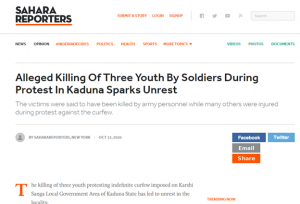
In a swift response action that can only be explained by the existence of an online news and accounts tracking team, the Nigerian Army jumped in on Twitter to call this Fake News:
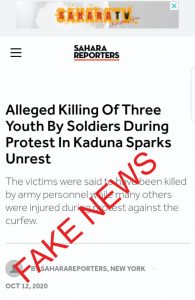
The events seemed to be very serious to be concealed by Twitter responses. Primarily due to the spellbinding and brave citizen reporters who kept on disseminating the news of the killings online, the information reached out foreign countries. The Globe and Mail, rephrasing the reports coming from Reuters journalists, published the following story past October 20th, documenting the shootings of protestors by Nigerian soldiers:
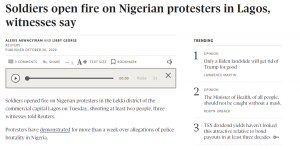

Later that very same day, the Nigerian Army took a screenshot of the story,and tweeted it up with the same Fake News notice:
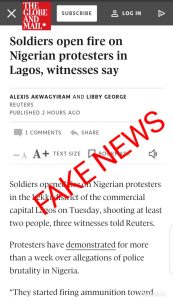
France 24, the French state-owned outlet, joined the international community denouncing the shootings:
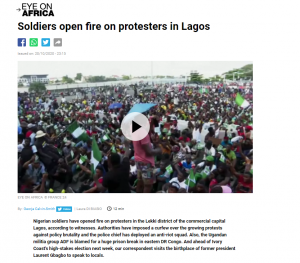
The Army fought back online, using the same discrediting tactic:
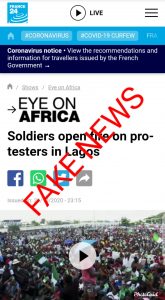
The very same October 20th, the news reached the US. The New York Times echoed the story:
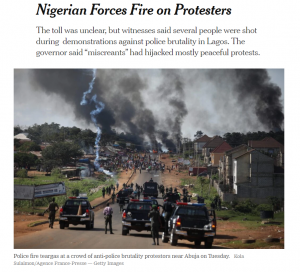
“Be Aware” was then posted along by the Nigerian Army with the Fake News diagonal message:
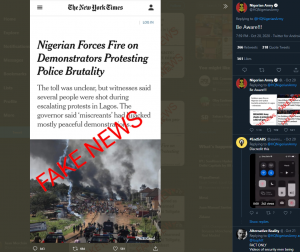
The Army has tweeted some other messages discrediting activists, using the same Fake News, denial tactic. Knowing that the name of their Cyber Warfare team is Crocodile Smile VI, it is likely that this aggressive campaign to cast doubt upon any negative news about the Nigerian government continues and gets more incisive. Now, as the BBC confirmed by running a fact check of those posts denouncing the police brutality, the #endSARS protest is not going unaffected by the omnipresent exaggeration and misinformation that is inherent to online activism (even the #metoo movement fell into it). These blunders (unintentional or premeditated) feed the discrediting machinery and encourage other governments and people in power to run the Fake News flag every time they feel they are being slandered. They might succeed, unfortunately: a US candidate made those two words famous worldwide; then, he became president.
Juan Merchan
October 2020